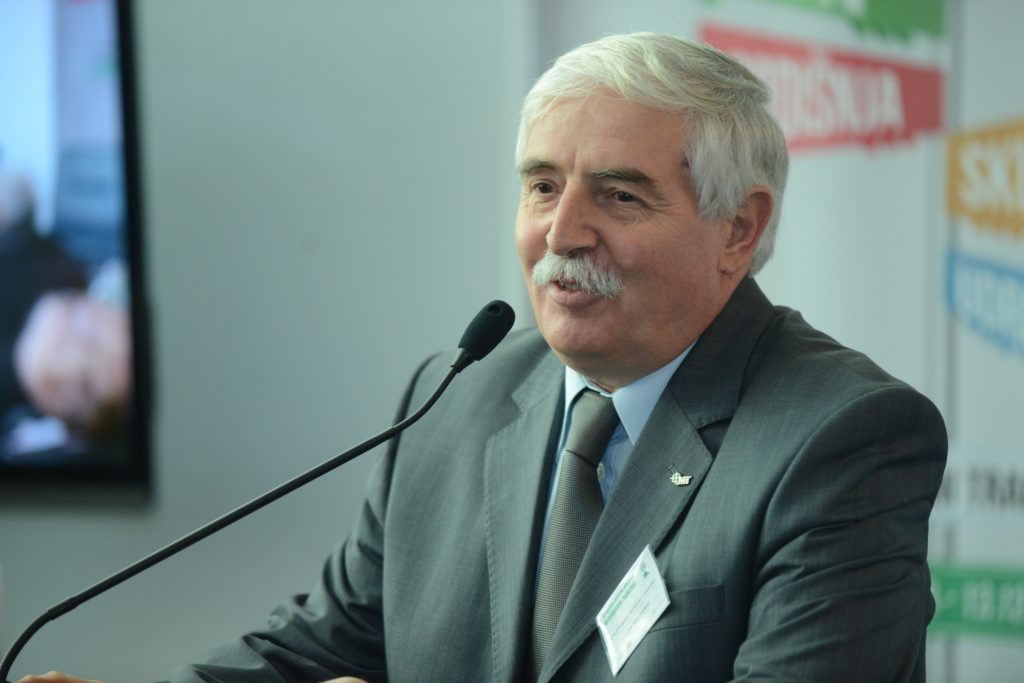Serbian Association of International Road Hauliers – MT brings together transport and logistics companies with more than 1,400 members.
Regardless of all the negative consequences that are the result of the coronavirus pandemic, transport, as an extended arm of production, will survive and Serbian transport companies will always be ready to satisfy the needs of production companies and the needs of citizens for goods and groceries.

How important is the work of a professional organization and what are the benefits for companies?
Transport, and especially international transport, is a very complex activity with numerous problems which resolution requires a lot of knowledge. Furthermore, some problems are not just a matter of professional expertise and that cannot be solved by individuals for their benefit. That is why it was only natural for Serbian transport companies to create an organization that will be tailored to them, in which everyone will be equal, receive the same information and the same protection, regardless of the size. In every profession, some people and organizations have different interests, there is competition on the market and we can accept that, but it is unacceptable for us that, when exercising their rights, some market participants want to get more on top of protecting their rights. We started with that premise and everyone soon wanted to be our members. We currently have over 1,400 members.
We constantly tell our members, and they are well aware of that, that they must have the same rights as all other carriers regardless of whether they are members or not and they have accepted that principle. The one who wants more than others doesn’t belong with us, regardless of the company size. Due to the volume of work that is spent on following all the operations that have to be carried out to provide quality service, transport companies do not have time to follow all the regulations both in our country and Europe. Therefore, the Association collects information and regularly informs its members, and often jumps in to help solve problems that have occurred regardless of the location. Information is essential for every activity, and especially for an activity in which every detail is important for the goods to be delivered on time. Very soon after the establishment, we realized that the competitiveness of small carriers is not the same as large ones, which get significant discounts from suppliers, so they have lower costs and market advantage. That is why we started negotiating discounts with suppliers for all members and in that way enabled small transport companies to have competitive prices of their services.
“The current situation caused by the coronavirus has resulted in the fact that, at the moment, we don’t feel the lack in the number of drivers due to the reduction of the workload”
What are the current regulations in this area and what else can be done to further improve business conditions?
As far as regulations are concerned, Serbia has harmonized both the laws and bylaws with the European ones, but still, the business conditions are far from European. The carrier’s income depends on the number of kilometres travelled. A transport company from Serbia cannot cover more than between 6,000 and 8,000km per month. In ideal conditions, this should be between 10,000 and 15,000km. The reasons for that are spending too much time at border crossings and unnecessary delays at internal customs offices. Our customs law is harmonized with the European one, it has entered into force, but it is not applied in the part that directly affects the speed of transporting goods. We need to digitalize the communication with the relevant authorities. I am first and foremost referring to the Ministry of Construction, Transport and Infrastructure. We have jointly started introducing electronic communication and business in returning and borrowing foreign permits required for each tour.
However, the potential and importance that such a system has and the possibilities of improving the work and facilitating the procedures are huge. The time that would be saved is also significant, which means that vehicles would be deployed sooner, and thus we would be more competitive. We hope that the development of the digital communication system with the aforementioned Ministry will continue soon. Also, enabling electronic submission of documents for vehicles and drivers which are under the jurisdiction of the Interior Ministry would significantly contribute to more efficient operation and lower idleness of transport vehicles. Serbian transport companies are investing a lot in acquiring new transport vehicles, with the Euro-6 category vehicles mostly used in international transport.
Unfortunately, Serbia also has a problem with the lack of a sufficient number of international permits, so Serbian carriers are forced to open companies in other countries. In addition to the fact that Serbia thus loses a certain income that will be generated in those countries, it also loses income from the excise tax on fuel used by vehicles registered in other countries. The problem of the fuel prices, which are higher in Serbia, also leads to Serbian carriers fuelling their vehicles more in other countries when engaging in international transport, and as a result, the Serbian stage budget gets less money from fuel excise. Although we have been highlighting that problem and asking for an increase in the refund of part of the excise tax, the state authorities did not see eye-to-eye with us on this matter. As a consequence, there is a greater presence of transport companies from other countries on our market, which generate income instead of us and buy fuel in their respective countries, thus filling the state budgets of their countries with excise duty funds.

How can the problem of lack of professional drivers, which was a hot topic last year, be solved?
The lack of professional drivers is a problem in all countries that has been present for a long time. The problem is that everyone wants a ready-trained driver, not a beginner who has not yet undergone any training or is not aware of whether he really wants to be a driver in international transport. Experienced drivers are used to being on the road and away from their families, and that is why carriers in the West are recruiting our drivers and non-EU drivers. Our Association started with driver training, but in addition to having a large number of people interested in re-training, there was also a problem of financing, on the one hand, and the problem of uncertainty among students as to whether this is the right profession for them. Without the state’s help, be it helping with funds for re-training or promoting it through dual education in vocational high schools, this problem cannot be alleviated. In order to alleviate the problems in Serbia, the state’s help would be required in reducing the waiting time at borders and completely changing the customs system (which is possible in practice and prescribed by law). By implementing these measures, our drivers could earn the same amount of money here, in our country, as in the Western countries, and they would not go to other countries because they offer a higher salary.
An additional problem is created by the requirement for a driver, who completes driving lessons at driving school and passes the driving test for the required categories, to also undergo initial training to qualify as a professional driver. This is a model and prerequisite in the EU that we had to implement in our country, and there would be nothing wrong with that if the new driver didn’t have to pay additional 140,000 dinars, which is currently the cost of this mandatory initial training in our country. We believe that the state authorities must react because we will soon be left without candidates for professional drivers due to economically difficult conditions for young people who are interested in becoming truck drivers.
“The decline in transportation prices will hit carriers the hardest, and we estimate that most carriers will end the year with the loss”
The coronavirus has stopped many industries in their tracks. What problems do transport company owners and drivers face and how much can border closures jeopardize normal supply?
The coronavirus has created major problems in the organization of transport. In the initial phase, due to the incompetence of the relevant authorities in all countries, the decisions made were often contradictory and inconsistent, although it was clear that everyone was aware that transport must not stop, and that goods, especially food for the population, must be transported unhindered. The borders were never really closed, but frequent delays led to a slowdown in transport and made it even more difficult for drivers. Border traffic jams still exist but they do not jeopardize normal supply but only prolong transport times and the normal work cycle of drivers. This makes the work of transport companies more difficult and much costlier.
What is your assessment of the impact of the coronavirus on the transport industry and what consequences do you expect to see?
Transport is so closely linked to production that the consequences that the coronavirus has left on production are also felt by the transport sector. Just as different activities are affected differently, transport companies also feel the consequences depending on what they are transporting. The most affected are transporters that serve the automotive industry. They have experienced a 30-35% decline in the work volume, while transporters that have a variety of customers have experienced a 20-25% decline. The reasons for this decline are the delays at the borders, not enough goods for return routes and a drop in prices as a consequence of the shortage of goods. The decline in transportation prices will hit carriers the hardest, and we estimate that most carriers will end the year with the loss.